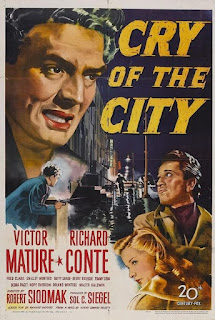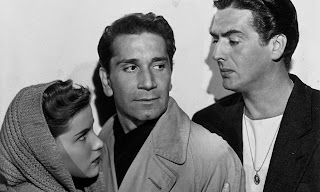"Oh Marty, why did you have to shoot? Why did you have to kill?"
Teena Riconti (Debra Paget)
Two years after his acknowledged classic of film noir, The Killers (1946), which we here at a wasted life find enjoyable but way overrated, and a year after the completely superfluous and dull flop that is the forgotten Time Out of Mind (1947 / Russian website), the talented but underrated Richard Siodmak (8 Aug 1900 – 10 Mar 1973) returned to the crime-ridden, corrupt world of the Big City to make another great crime film, Cry of the City.
Based on the novel The Chair for Martin Rome, by Henry Edward Helseth (10 Jan 1911 – 25 Sept 1983), a now forgotten second-string author who also supplied the bones to two other lesser crime films, Outside the Wall (1950 / full film) and State Penitentiary (1950), Cry of the City was shot partially in Los Angeles (interiors) and on the streets of New York City. Even if the film doesn't enjoy the popularity and respect of some of his other B&W crime films, Cry of the City is generally considered an important film of the genre and Siodmak's career — and we here at a wasted life would not be liable to disagree. An immeasurably watchable and well-made film, Cry of the City proved to us to be far more enjoyable, better made, and better structured and scripted than The Killers.
Trailer to
Cry of the City:
The plot of the movie is perhaps not the most original in the world: cop hunts bad guy. In this case, the bad guy is the Italian-American cop killer Martin Rome (Richard Conte [24 Mar 1910 – 15 Apr 1975]*), while the [main] good-guy cop, who grew up in the same poverty-ridden NYC neighborhood as Marty, is Lt. Vittorio Candella (Victor Mature [19 Jan 1913 – 4 Aug 1999] of One Million B.C. [1940 / colorized trailer], I Wake Up Screaming [1941 / full film] and Head [1968 / trailer]).
* Of The Spider (1945 / full movie), Whirlpool (1950 / trailer), Extraña invasión a.k.a. Stay Tuned for Terror (1965 / full film in Spanish), Death Sentence (1968 / Italo trailer), The Return of the Exorcist (1975 / Italo trailer) and more).
Cry of the City opens with Marty apparently on his deathbed, surrounded by his extended family and full of bullets taken during the shootout in which he killed a cop, for which a walk to the electric chair is guaranteed should he survive the hospital. But just before he's wheeled into the OP room, he's visited by the lawyer W. A. Niles (the visually sleazy Berry Kroeger [16 Oct 1912 – 4 Jan 1991];* Niles, whose real client is currently facing execution for the robbery-murder of a rich old lady, attempts but fails to coerce the virtually comatose Marty into confessing to the crime.
* Of Gun Crazy (1949 / trailer), Chamber of Horrors (1966 / trailer), Nightmare in Wax (1969), The Wild Scene (1970 / trailer), The Incredible 2-Headed Transplant (1971 / trailer), The Seven Minutes (1971 / trailer, with Edy Williams) and more.
It is this robbery-murder of the old lady that proves to be the catalyst of the rest of the film. Marty may not have participated in that crime, but a ring that belonged to the woman is found in his possession, which thus suddenly makes him a viable suspect. And since the robbery-murder was committed by a man and a woman, suddenly the unknown woman who visited him on his not-quite deathbed, his underage gal Teena Riconti (Debra Paget*), becomes a sought woman: the police want to question her, and the corrupt lawyer wants her so as to force Rome to take the fall for his client.
* Of From the Earth to the Moon (1958 / trailer), Why Must I Die? (1960 / full film), Most Dangerous Man Alive (1961 / "movie misogyny"), Tales of Terror (1963 / trailer) and The Haunted Palace (1963 / trailer).
Transferred to the prison's hospital ward, Rome does that which is so often oddly possible in movies: with the help of a sub-intelligent trustee named Orvy (the seldom credited character actor Walter Baldwin [2 Jan 1889 – 27 Jan 1977] of The Devil Commands [1941 / trailer] and much, much more), Rome escapes despite his injuries. It is, admittedly, a nerve-racking interlude that is probably shorter than it tensely seems, but let's just put the technical aspects behind the jailbreak to easier, lazier times, and old locks.
Now on the lam and himself searching for his girl, Rome, already a morally compromised figure, gets caught in a whirlpool of events that drag him deeper and deeper down towards damnation and tragedy, even as Lt. Candella and his partner Lt. Jim Collins (Fred Clark [19 Mar 1914 – 5 Dec 1968]*) remain dedicated to finding Teena (and Rome) first.
* Of The Unsuspected (1947 / trailer), Sunset Blvd (1950 / trailer), The Curse of the Mummy's Tomb (1964 / trailer), Dr Goldfoot and the Bikini Machine (1965 / trailer) and more.
For a man that continually relies on the help of friends and family, including his ex-girlfriend Brenda Martingale (a young, slim and attractive Shelley Winters [8 Aug 1920 – 14 Jan 2006] of way too many fun films, including The Night of the Hunter [1955 / trailer], Bloody Mama [1970 / trailer], The Poseidon Adventure [1972 / trailer] and Cleopatra Jones [1973]), who sort suddenly drops into the film unannounced from nowhere, Rome himself only turns colder and harder as he desperately tries to find Teena and the financial means to escape the city. Unluckily for him, Lt. Candella is a tenacious, if not almost obsessive cop.
Most of the people Rome comes into contact with in Cry of the City are flawed characters, if not evil, and they, like the few good people of the movie, all get pulled down one way or another due to their interaction with him: the lawyer is corrupt and ends up dead; the lawyer's partner in crime, the masseuse Rose Given (an absolutely amazing Hope Emerson* [29 Oct 1897 – 24 Apr 1960], looking somewhat like Jeffrey Tambor from Transparent [2014-17 / trailer]), no better, but she at least survives the film; the cash-strapped doctor who sews Rome's wounds in the back seat of Brenda's car ends up facing jail time, as does Brenda; Marty's father loses his honored position in a local association; the lawyer's inquisitive secretary dies by a stray bullet** — and by the end of the movie, if Marty had his way he would drag down his younger brother Tony (Tommy Cook of Panic in the Streets [1950 / trailer], High School Hellcats [1958 / trailer / full movie] and Missile to the Moon [1958 / trailer / full movie]), his whole family, and even Teena.
* The last woman of crime of similar threatening presence that we remember from the "classic" films of yore is Madame Barabbas (Alison Skipworth [25 Jul 1863 – 5 Jul 1950]) in William Dieterle's loose and extremely substandard adaptation of the novel The Maltese Falcon, Satan Met a Lady (1936).
** Pretty funny, actually: while struggling with Marty, Niles the Lawyer shoots wildly into the ceiling — and his secretary Vera (Joan Miller [18 Feb 1910 – 31 Aug 1988]), who's been listening through the door from the next room, is shot dead. No bullet hole in the wall, no shattered door glass — the bullet just magically hits her. A rather glaring continuity mistake that is so obvious that you can't miss it if you wanted to. Another WTF moment comes during the movie's resolution: the magic gun is simply left lying on a tenement doorstep as characters drive away...
** Pretty funny, actually: while struggling with Marty, Niles the Lawyer shoots wildly into the ceiling — and his secretary Vera (Joan Miller [18 Feb 1910 – 31 Aug 1988]), who's been listening through the door from the next room, is shot dead. No bullet hole in the wall, no shattered door glass — the bullet just magically hits her. A rather glaring continuity mistake that is so obvious that you can't miss it if you wanted to. Another WTF moment comes during the movie's resolution: the magic gun is simply left lying on a tenement doorstep as characters drive away...
For much of the movie, Marty is the more interesting and charismatic character, and as an anti-hero is definitely has the audience on his side for a large portion of the time, only losing audience identification as his growing desperation makes him harder, more narcissistic, more indifferent to everyone around him. By the final scene of him with his beloved Teena in a church, she looking like an innocent Madonna, one comes to dread who he might take down next — a dread that is hardly lessened by the inanely pedophile casting of the film: Debra Paget, in her credited feature film debut, is much too young for the man, who actually also refers to her as "just a girl" at one point. In real life, and looking it onscreen, she was fourteen to Conte's late-thirties. It is hard to believe that the ick-factor that raises its head in her scenes wasn't there when the film came out, but then, times were different.
Beautifully filmed and tightly scripted, Cry of the City quickly grabs onto the viewer and doesn't let go until the final frames. The movie has no flab, and the twists are not always expected. The acting varies from excellent (Conte and most secondary characters) to uneven (Mature and Paget), and but for the expedient (if tensely staged) breakout and magic bullet, the events on screen remain firmly grounded in reality. The city of the film is a cruel one, one in which looking out for number one is the main rule and all that which is decent — family, love, friendship — has barely a chance to survive or remain uncorrupted. For that, notwithstanding the overriding corruption of the city and the tragic ending, a ray of hope remains: Marty's younger brother, despite his desire to live up to his brother's expectations, proves to have a bit more moral fiber than his beloved brother.
The novel The Chair for Martin Rome was also the basis of a later French movie, so in theory Cry of the City was eventually remade in 1971 as the somewhat obscure One Way Ticket a.k.a. Un aller simple.
German Trailer to
One Way Ticket a.k.a. Un aller simple:


.png)


.png)







.png)


No comments:
Post a Comment